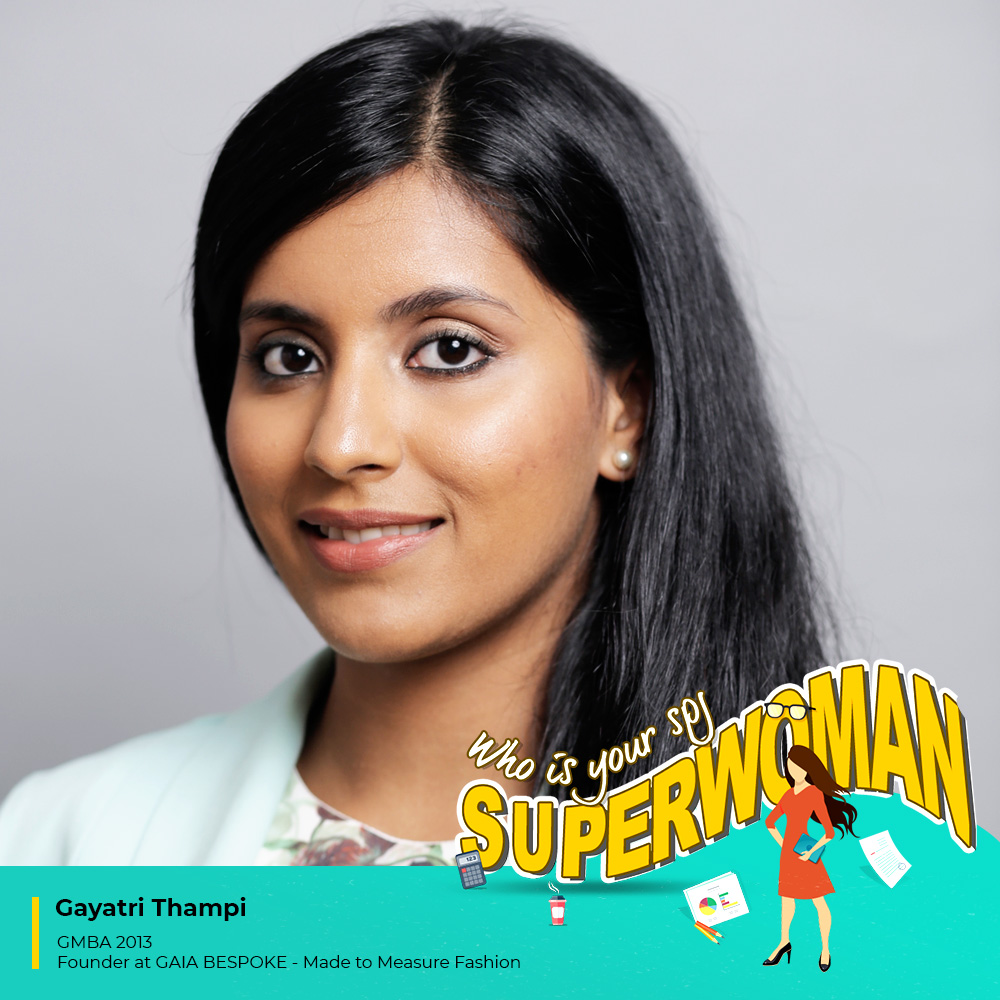Hearing from the SPJ Superwomen – Alumni Talk with Gayatri Thampi
On the occasion of International Women’s Day, we at SP Jain decided to catch up with a few SPJ Superwomen alumni, who are out there making a difference every day. Let us hear from Gayatri Thampi (GMBA 2013), Founder of GAIA Bespoke, as she tells us about her journey till today.

Could you give a short introduction of yourself for the new members of the SP Jain family?
I’m Gayatri Thampi, an SPJ Alumnus from the batch of 2013.
After 5 years of Corporate work-experience in domains such as media, automobile and FMCG, I bid adieu to my corporate career to venture on an entrepreneurial journey with my start-up, GAIA Bespoke.
How did you get the idea for your business?
The idea arose from a personal problem. While in my corporate stint, I found myself struggling to find the right clothes for office which suited my style and size. If one was right, the other wasn’t. I looked hard to find a custom brand for corporate wear, but to no avail. That’s when I recognised the gap in the market, for thousands of working women like me – there was ample demand and 0 supply. Given my passion for fashion and design, I decided to jump at the opportunity with my own Fashion Tech Start-Up. Today, along with office wear, we have even ventured into customisable casual and party wear catering to the entire western wear segment via a website and store in the heart of the city. With the help of technology, women can also design their own dresses with us on our website.
What was your mission at the outset? What challenges did you face in achieving this goal?
The mission was to change the way women dress. For changing the fact that women across age groups had to settle and also squeeze themselves into ‘Off-the-rack’ sizes at expensive brands that weren’t even made for Indian body types.
The challenge with a custom wear label was to build it as an online business. With such a large amount of customisation, women wanted the retail experience in terms of look and feel, something a purely online model lacks. Hence, instead of following the band-wagon of e-tailers, we decided to really listen to what the market was telling us and thereby pivoted into an offline business model.

Starting a company from scratch and running it successfully are no easy tasks. What factors have helped you achieve this feat?
Yes, it’s a lot harder than one can imagine, and it’s not been easy. Stats show that only 2% of start-ups succeed, and that is a constant driving force to ensure the company succeeds for the long run, to be a part of the top 2% of start-ups to ever exist. It’s taken a lot of perseverance and support from my family to be able to run the company by myself. Also, we have been fortunate enough to be backed by a Start-Up Accelerator – Scaleminds (by Fundtonic) that took us from being bootstrapped to an accelerated company with Investor Backing. So, I’d say a little bit of luck also plays an important role.
Studies have found that women-helmed companies report 13 per cent higher revenues than those run by men on an average. Why do you think this is?
I’d like to believe it’s because us women are smarter!
Jokes apart, I believe women have certain skill-sets that arguably help us become better leaders, not undermining the skill-sets that men have, in any way. Also, truth be told, I don’t think one’s managerial capabilities are based on gender – I think it’s highly subjective and contextual and has little to do with gender, alone.
In an era where women are repeatedly standing up for themselves and claiming the space they deserve, we still have fewer women entrepreneurs than men. How do you think we can overcome this? How can we encourage young girls at school level to pursue their dreams?
I think most educational institutions (both schools and colleges) are pre-conditioned to churn out “job-ready” candidates and that’s the root cause of this situation. It is often drilled into young impressionable minds that getting a high-paying job with a stable salary is the be all and end all of one’s career. The entrepreneurial spirit needs to be celebrated more by the institutions themselves – guest speakers (meeting and hearing from women who have made it or are on their way, sharing real journeys may inspire children to become problem solvers. Business-oriented projects, even something as small as managing a lemonade stall for a day goes a long way in teaching a child the nuances behind running a business – schools need to give students an opportunity to explore such experiences, so one can identify if the adrenaline of “making a sale” drives them.
Related Posts
-
 In This World of Internationalisation, Will You Survive?
No Comments | Jul 27, 2011
In This World of Internationalisation, Will You Survive?
No Comments | Jul 27, 2011 -
 Breaking corporates shackles to start a wealth management boutique
No Comments | Feb 18, 2015
Breaking corporates shackles to start a wealth management boutique
No Comments | Feb 18, 2015 -
 S P Jain (Global) alumnus Chetan Sodhani shines
No Comments | Apr 2, 2015
S P Jain (Global) alumnus Chetan Sodhani shines
No Comments | Apr 2, 2015 -
 Living costs in Sydney
No Comments | Apr 5, 2015
Living costs in Sydney
No Comments | Apr 5, 2015
